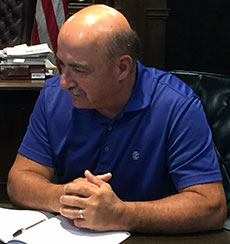Hear the newsmakers themselves during Local News over 97.9 WHAV FM, every half hour, weekdays.
Jesus Ruiz is a former gang member who went to prison. He is now a minister with Common Ground, Winter Street. (WHAV News photograph.)

Haverhill Public Schools Intervention Counselor Jon Mangion suggested programs may have to begin as early as third grade to have an impact. (WHAV News photograph.)
Curbing a growing gang problem in Haverhill in the long-term means bringing school programs down to students as early as third grade.
A group of school, community leaders and a former gang member came to that consensus during an initial meeting Wednesday of Mayor James J. Fiorentini’s Task Force for Gang Violence. Meanwhile, so-called “streetworkers” could help attack the current problem—which has contributed to at least four shooting incidents in the last two months in the city’s Acre neighborhood. Gregg Croteau, executive director of Lowell’s UTEC, said the well-attended meeting is not unlike his organization’s beginnings.
“This is such a critical step to get the right folks in the room. We started really grassroots and young people came up with the idea,” he said.
UTEC, which uses streetworkers—peers who are more likely to be accepted and trusted by gang members—to offer jobs and educational opportunities.
All attention during the meeting was on Jesus Ruiz’s descriptions of his first-hand experiences as a gang leader. “I was in state prison. It’s hard to get a job. Some are homeless. Some need rides to detox,” he told those gathered. He explained he is now a minister associated with Common Ground on Winter Street.
On the frontlines, Detective Lt. Robert P. Pistone agreed streetworkers would prove helpful. “We’re going after the bad apples. We know who are responsible for this.” Another short-term solution might be to add another school resource officer, said Detective Sean Scharneck. He served in that role at the high school for 13 years.
Fiorentini asked attendees whether a trade union apprenticeship program would help, but learned there are only a small number of openings, and many applicants cannot be admitted because of their past criminal records or lack of high school diplomas.
Over the long term, Katie Vozeolas, school nurse supervisor, and Jon Mangion, school intervention counselor, said programs must begin with very young students. He explained programs must begin with third or fourth graders as opposed to eighth or ninth graders of yesterday. “The idea is to catch the kids who already have this difficulty,” Mangion said. Of all of the ideas mentioned, he explained, the “support piece” is missing.
Other participants included Keith Boucher of Mount Washington’s Urban Kindness, YMCA Executive Director Tracy Fuller and Kim Boisselle and Michael Kitz of the North American Family Institute.
